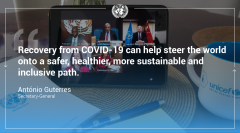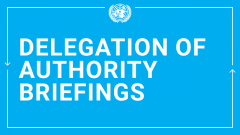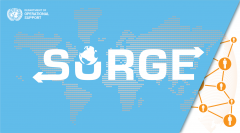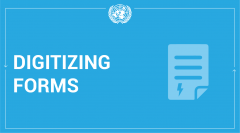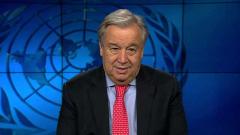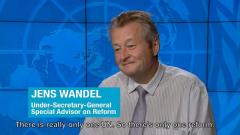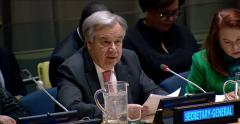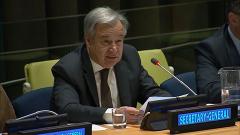Due to the global and dispersed nature of the United Nations, system-wide collaboration has always been a challenge. In person meetings are not always possible and entities across the UN system employ different tools and systems for their own work.
News
Impact Stories
In recent years, the United Nations has undergone a series of transformative changes that have impacted the Organization’s people, processes and technology.
Adapting to the pandemic and addressing unprecedented challenges is driving staff and leadership to act fast and drive change. Building on the new structures and processes that reform put in place, the United Nations is quickly adopting a more collaborative, agile, and less bureaucratic way of working, accelerating processes and dramatically increasing collaboration between departments and entities.
The United Nations has provided ongoing support to peace efforts in Papua New Guinea since the national Government and leaders of the autonomous region of Bougainville signed the Bougainville Peace Agreement (BPA) in 2001. The BPA marked the end of a decade-long conflict in which almost 20,000 people died. The United Nations backed the original peace negotiations and subsequently established two special political missions, the United Nations Observer Mission in Bougainville (UNOMB) and the United Nations Political Office in Bougainville (UNPOB).
The political landscape in Sudan changed dramatically in 2019, thanks to the courageous Sudanese men, women and young people who rose up to push for the realization of their long-held aspirations for democracy and peace. The drive for change in Sudan culminated in the establishment of a civilian-led government on 17 August 2019 and the launch of a process that provides a unique opportunity to achieve a just and comprehensive peace throughout the country. This has transformed the operational context for the United Nations System. After decades of humanitarian, peacekeeping and development support, the United Nations is entering a new phase of partnership with Sudan, including in Darfur.
In the face of mounting unrest in Burkina Faso, the United Nations System is mobilized to respond to security challenges using a wide range of tools in support of government. UN Resident Coordinator in Burkina Faso, Ms. Metsi Makhetha, explains how prevention is a key element of the reform.
- ‹ previous
- 2 of 2
Reform News
To establish a dialogue with heads of entity who received enhanced delegated authority from the Secretary-General on 1 January 2019, the Under-Secretaries-General for Management Strategy, Policy and Compliance (DMSPC) and for Operational Support (DOS) co-chaired two regional briefings, with support from their Assistant Secretaries-General in late January.
This is the main message of UN Secretary-General António Guterres at the ECOSOC Operational Activities for Development Segment, where he briefed Member States on the progress of repositioning the UN development system.
In recent years, the United Nations has undergone a series of transformative changes that have impacted the Organization’s people, processes and technology.
Due to the global and dispersed nature of the United Nations, system-wide collaboration has always been a challenge. In person meetings are not always possible and entities across the UN system employ different tools and systems for their own work.
It might seem like critical situations or incidents should be second nature in the United Nations, yet sometimes capacities are stretched beyond any norm or barriers to reallocation of resources put up obstacles. As part of management reform, a dedicated capacity in the Department of Operational Support was created to support the start-up, surge, or closure of Secretariat entities, as well as to better respond to critical incidents.
The global human resources strategy of 2019-21 set a goal to become “simplified, decentralized, flexible, and field-oriented” in order to drive strategic human resources management and empower managers.
Then COVID-19 exposed an overreliance on physical paperwork and signatures in our human resource management. Adopting electronic signatures and migrating paper-based forms into digital systems will help the United Nations strengthen its ability to manage human resources in an ever-changing world.
- ‹ previous
- 2 of 3
- next ›
Video
United Nations Secretary-General António Guterres emphasizes how the reforms will transform the work of the United Nations. “The aims of reform are clear: To focus more on people and less on process. To become more nimble and effective. And to build a workplace of equality, diversity and integrity."
24 Oct 2018 - In this brief interview, Special Adviser to the UN Secretary-General on Reforms, Mr. Jens Wandel of Denmark, introduces the three UN reform streams (Development, Management, and Peace and Security) as one “United to Reform” effort, all aimed at transforming the UN into a more effective, nimble and fit for purpose Organization, which can better serve its beneficiaries around the globe.
United Nations Secretary-General’s Informal Briefing to the General Assembly on the Implementation of the United Nations Reform.
The UN MEDEVAC Mechanism serves as an example of a successful One UN partnership between numerous entities to design, resource, and implement a system-wide medical evacuation framework in the face of the unprecedented circumstances of the COVID-19 pandemic. Complementing First Line of Defense (FLOD) activities, COVID-19 MEDEVAC is a last resort, which provides life-saving support for severely ill COVID-19 patients who require a level of care not available at their location. This ensures that UN personnel, partners, and their dependents can continue to stay and deliver.
In the face of mounting unrest in Burkina Faso, the United Nations System is mobilized to respond to security challenges using a wide range of tools in support of government. UN Resident Coordinator in Burkina Faso, Ms. Metsi Makhetha, explains how prevention is a key element of the reform.
The United Nations General Assembly has adopted an ambitious and comprehensive transformation of the UN development system. This is the first of a series of reform initiatives being put forward by Secretary-General António Guterres to make the UN fit for purpose in a changing world.




